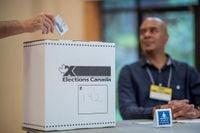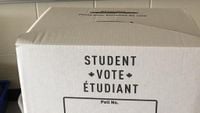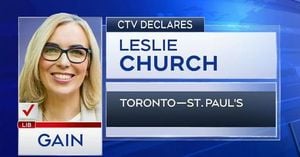In a significant shift in political preferences among Canadian youth, the latest results from the CIVIX Student Vote Canada program indicate that students would have elected a Conservative minority government in the 2025 federal election. This mock election, which took place across more than 5,900 schools, saw over 900,000 students cast their votes, marking a notable departure from previous elections where student preferences leaned more towards left-leaning parties.
According to the data released on April 29, 2025, the Conservative Party, led by Pierre Poilievre, garnered 165 seats, representing 36.4% of the popular vote. The Liberal Party, under Mark Carney, followed with 145 seats and 31.7% of the vote, forming the official opposition. Meanwhile, the New Democratic Party (NDP) managed to secure only 13 seats, a significant drop from their previous standing, while the Bloc Québécois and the Green Party won 18 and 2 seats, respectively.
The results from the Student Vote Canada program reflect a substantial change from the 2021 election, where students elected a Liberal minority government with the NDP as the official opposition. In 2021, the Liberals won 118 ridings with 24.1% of the popular vote, while the NDP secured 108 ridings with 28.5%. The Conservatives, at that time, held only 88 ridings with 25.1% of the vote.
In contrast, the 2025 election results highlight a remarkable surge for the Conservatives, who nearly doubled their seat count from the previous election. This shift is attributed to a sharp decline in support for the NDP, which fell from 108 seats in 2021 to just 13 in 2025. The Bloc Québécois remained stable, winning 18 seats, while the Green Party saw a slight decrease in their representation.
Students participating in the Student Vote program were encouraged to learn about democracy and the electoral process, researching party platforms and discussing key issues with peers and family members before casting their ballots. This educational initiative, conducted in partnership with Elections Canada, aims to engage young people in civic participation and instill a sense of responsibility regarding their role in the democratic process.
The survey conducted by CIVIX also revealed that the top priorities for Canadian youth included addressing the cost of living, housing affordability, and healthcare. These issues resonated strongly with students, influencing their voting behavior and preferences. The relationship between Canada and the United States also emerged as a significant concern among students, particularly as the election approached.
In the riding of Carleton, Pierre Poilievre was elected as the student prime minister, while Mark Carney secured his position in Nepean, representing the Liberal Party. The Bloc Québécois saw Yves-François Blanchet elected in Beloeil—Chambly, and the NDP's Jagmeet Singh lost his seat in Burnaby South. The Green Party's Elizabeth May won her seat in Saanich—Gulf Islands, while Jonathan Pedneault was not elected in Outremont.
The results from the Student Vote Canada program not only reflect the political inclinations of young Canadians but also serve as a bellwether for future elections. The shift towards the Conservative Party among students mirrors trends observed in the broader voting population, particularly among younger voters who have expressed concerns about economic issues and government policies affecting their lives.
This mock election serves as a crucial reminder of the importance of engaging youth in the democratic process and understanding their perspectives on governance and policy. With the official results of the federal election yet to be finalized, the Student Vote results provide valuable insights into the evolving political landscape in Canada.
As the country moves forward, the implications of these results will likely be felt in future elections, shaping the dialogue around key issues and influencing how parties position themselves to attract the youth vote. The CIVIX Student Vote program continues to play a vital role in fostering civic engagement among young Canadians, ensuring that their voices are heard and considered in the political arena.






